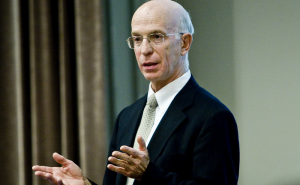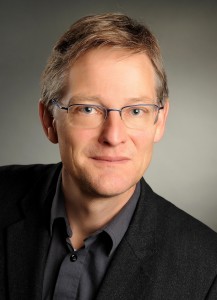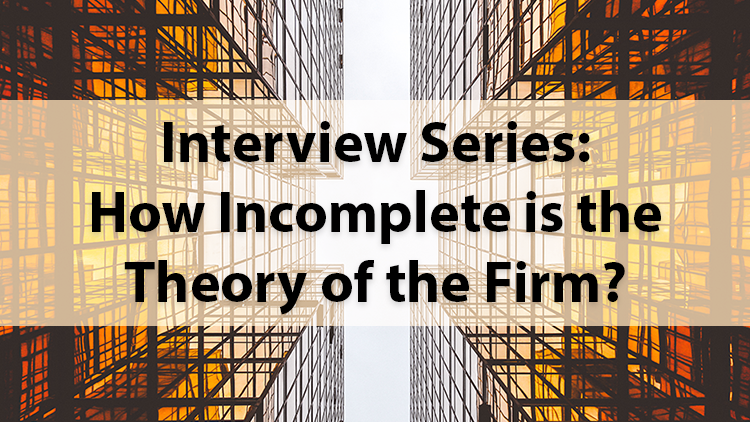In the final installment of ProMarket’s interview series on the economic theory of the firm, we ask Princeton University professor Alan Blinder and University of Mannheim President Ernst-Ludwig von Thadden about the role of corporations and governments in the market.
On March 3-4, the Stigler Center at the University of Chicago Booth School of Business, along with Harvard Business School and Oxford University, hosted a conference in Chicago to answer the following questions: Should the economic theory of the firm be modified? And if so, how?
The standard (economic) theory of the firm is silent on the role firms can play in shaping the rules of the game under which they operate. In reality, many firms lobby politicians and try to capture regulators in order to modify the rules of the game in their favor. Some scholars have argued that the resources devoted to these activities are relatively so small that they are likely to have insignificant effects, and/or that regardless of how much firms invest in political activities, in a well-functioning democracy there are countervailing forces that effectively level the playing field. Other scholars have noted that the resources firms devote to shaping the rules of the game to their own advantage are sufficiently large and their effects sufficiently important to warrant a rethinking of the standard economic theory of the firm. Which of these two views has more empirical support? If the latter, should the economic theory of the firm be modified? If so, how, and is the potential fix better or worse than the existing problem?
The following interview with Alan Blinder and Ernst-Ludwig von Thadden is part of an interview series with influential scholars who are addressing these issues in their work. You can view all previous installments here.
Alan Blinder, Princeton University

Alan Blinder is the Gordon S. Rentschler Memorial Professor of Economics and Public Affairs at Princeton University, the former Vice Chairman of the Federal Reserve (June 1994 to January 1996), and a regular columnist for The Wall Street Journal. Blinder also served as a member of President Bill Clinton’s original Council of Economic Advisers from January 1993 until June 1994, where he was in charge, among other things, of the administration’s forecasting. He has been studying the financial system for close to 30 years, and is the author or co-author of 20 books, among them the New York Times bestseller After the Music Stopped: The Financial Crisis, the Response, and the Work Ahead (Penguin Press, 2013).
Q: The neoclassical theory of the firm does not consider political engagement by corporations. How big of an omission do you think this is?
I think it’s more economists practicing comparative advantage than anything else. Nonetheless, it does omit something important.
Q: To what extent is political engagement by corporations responsible for the current populist discontent?
Good question. I think it’s a minor contributor. Could Trump’s appeal have been based on anti-corporate sentiment? But then again, what was/is it based on?
Q: The World Economic Forum has called for “reimagining” and “reforming” capitalism. To what extent is this need for reform the result of disruption brought by technological change, globalization, and immigration and to what extent is it the effect of rent-seeking and regulatory capture?
My guess, and it’s not more than that, is that the backlash against globalization—and, in particular, the grotesquely unequal distribution of its fruits –is the major player. If people understood better, they’d realize that technology is a far more powerful force than trade or immigration. But they don’t. Besides, who wants to oppose technological advancement?
Q: Some people describe Donald Trump’s economic policies as “corporatism.” Are you more worried by Trump’s interference in the market economy or by companies’ ability to subvert markets’ rules?
I’d describe Donald Trump’s economic policies as “confusion.” Yes, I’m worried about his interferences into company affairs. But I’m far more worried about the dangers of a trade war.
Ernst-Ludwig von Thadden, University of Mannheim

Ernst-Ludwig von Thadden is a Professor of Economics and Finance at the University of Mannheim, where he has served as President (Rector) since October 2012. Previously, he was a professor of economics at the University of Lausanne. His research covers corporate finance, capital markets, financial institutions, the theory of the firm, game theory, contract theory, industrial economics, politics economy, and law and finance.
Q: The neoclassical theory of the firm does not consider political engagement by corporations. How big of an omission do you think this is?
This is an omission, but no problem. The neoclassical theory of the firm is a technical theory that makes statements about production and market-related costs. Its normative conclusions are therefore deliberately limited. For more general statements about problems such as the welfare analysis of the interplay between political power and economic power we need broader theories.
Q: To what extent is political engagement by corporations responsible for the current populist discontent?
In my view such engagement has been significant and is potentially dangerous, but it is not mainly responsible for the populist discontent. First, the broad public does not know much about what goes on behind the scenes (this is more of a problem in Europe, where capitalism is less transparent than in the U.S.). Second, political engagement by firms often benefits workers as much as capitalists, take the example of the recent Volkswagen scandal in Germany. In fact, the current populist discontent seems mai
nly driven by a fear of change and uncertainty—and firms often lobby in favor of the status quo and of predictable economic environments.
Q: The World Economic Forum has called for “reimagining” and “reforming” capitalism. To what extent is this need for reform the result of disruption brought by technological change, globalization, and immigration and to what extent is it the effect of rent-seeking and regulatory capture?
At least in Europe, I don’t think that firms over last 30 years have become more powerful and more successful at capturing government.
Q: Some people describe Donald Trump’s economic policies as “corporatism.” Are you more worried by Trump’s interference in the market economy or by companies’ ability to subvert markets’ rules?
I think that both phenomena are two sides of the same coin. Trump is an entrepreneur, who like most firms is not happy about the market’s straitjacket, and can now use his new position to continue this struggle at a new level. I am more worried about Trump’s ability to ease the market’s straitjacket by weakening government control of the market mechanism or by reducing competition.






